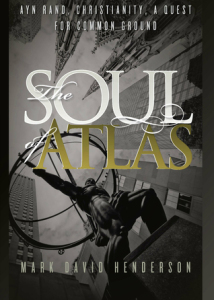
The Soul of Atlas: Ayn Rand, Christianity, a Quest for Common Ground, Mark David Henderson. Lexington: Reason Publishing, 2013.
Summary: Is there any way to reconcile the thought of Ayn Rand and the Christian faith? Through a personal narrative of dialogues with his two fathers, one a Christian, and one an adherent to Ayn Rand’s philosophy (Objectivism) the author explores what possible ground could exist between Objectivists and Christians.
Ayn Rand argued that we ought to pursue that which is of chief value, which is our own selves, validated in productive work. The universe is all there ever was. There is no God. Christians see our chief end as to glorify the creator God who made us in his image. Rand criticized the altruism and self-sacrifice she saw at the center of Christian ethics as weakness. Christians would argue there is no virtue in selfishness. It seems these two worldviews are poles apart and utterly irreconcilable.
Mark David Henderson was stuck with a dilemma. There are two men, both fathers, in his life. One he calls Dad and he is a Christian. The other is John, an adherent of Ayn Rand’s philosophy of Objectivism. He deeply respects both men and has experienced the imprint of both men’s worldviews on his life, even though he has finally chosen Christianity over atheism, because as he explains in one place,
“In connecting my fathers’ world views to Meaning it became clear that Dad lives to glorify God and sees Meaning as dependent upon a Supreme Being. John sees existence itself as Reality. Along with Rand, he says that asking for anything else is a futile pursuit. Both men would consider their values objective, that is to say, true for everyone. The turn for me happened here. I found that John’s explanation didn’t satisfy, and while dissatisfaction itself didn’t validate dad’s answer, I felt myself leaning in his direction. I recognized there is plenty we may value in life that is not lasting. It may be meaningful, in a temporal sense, but if it came about by chance and it fades away, there is no ultimate purpose to it. Valued aspects of life may be meaningful, but this is not Meaning” (p. 127).
This gives you a flavor of his writing. I worried as I got into the book that the “two fathers” theme would get schmalzy but it never did. There was both feeling and intellectual grit in the discussion of these two men’s ideas about Sex, Money, Power, Meaning, Joy and more. Along the way he recognizes places of convergence, common grounds of a common humanity between two disparate world views. Neither man nor the beliefs they represented could accept a “hook up culture”. Both recognized the value in productive work and the monetary measures of this although each placed this differently in their values hierarchies. Both agree that the best government is limited government, whether this infringes upon the initiative of productive individuals or because governments are tempted to usurp the place of God.
Perhaps Henderson’s most significant insight, influenced by the writing of John Piper was to recognize convergence around the idea of rational self-interest. In fact, God is the greatest egoist of all, because he rightly puts himself and his glory above all else. What distinguishes the Christian from the egoist is simply the recognition that there is One greater than oneself of ultimate worth and indeed, the greatest Joy one can have in life is to place value in what is of ultimate worth.
What I liked about this book is that Henderson was not writing a work of syncretism–fusing Christianity and Randian Objectivism uncritically. Rather he recognizes that when it comes to some fundamentals, they are irreconcilable. Yet he does something else. He recognizes that we may differ without being utterly different. There are common grounds that may be found between those who differ and things we may deeply admire even in someone we might not agree with. His vision is one that recognizes how important such common agreement is to work in the public square to maintain the rule of law, basic human rights, and constitutional liberties. Most of all, though, I appreciated the insight that if Atlas represents Rand’s highest ideal for humankind, that it is in the gospel that this ideal, this deepest longing in the soul of Atlas finds its realization. And that just may reconcile the irreconcilable.
_____________________________________
Disclosure of Material Connection: I received this book free from the author. I was not required to write a positive review. The opinions I have expressed are my own. I am disclosing this in accordance with the Federal Trade Commission’s 16 CFR, Part 255 : “Guides Concerning the Use of Endorsements and Testimonials in Advertising.”
Editor’s Note: Thank-you to Bob Trube for sharing his reviews with Emerging Scholars! Bob first posted the above review on Bob on Books. ~ Thomas B. Grosh IV, Associate Director, Emerging Scholars Network
Bob Trube is Associate Director of Faculty Ministry and Director of the Emerging Scholars Network. He blogs on books regularly at bobonbooks.com. He resides in Columbus, Ohio, with Marilyn and enjoys reading, gardening, choral singing, and plein air painting.

Leave a Reply